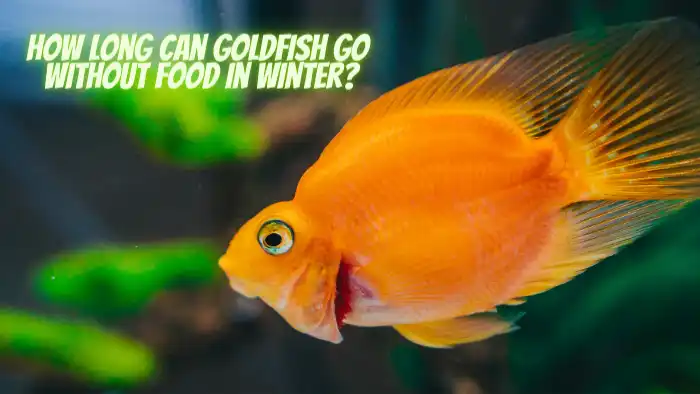Goldfish can survive for several weeks without food in winter, but it is recommended to feed them every two to three days to maintain their health and activity levels.
Goldfish are popular freshwater pets known for their vibrant colors and graceful swimming. Native to East Asia, these beautiful creatures have been bred for centuries, resulting in a wide variety of shapes, sizes, and colors.
When winter arrives, goldfish face unique challenges due to the drop in temperature. Understanding their dietary needs during this time is crucial for their well-being.
Goldfish Feeding Habits
In a controlled environment, such as an aquarium or pond, they are typically fed commercial fish food designed specifically for their nutritional needs.
Additionally, goldfish can benefit from a varied diet that includes live or frozen foods, such as brine shrimp or daphnia, and plant matter like peas or lettuce.
Winter Feeding Guidelines for Goldfish
During winter, goldfish enter a period of reduced activity known as torpor. Their metabolism slows down, and they require less food compared to warmer months.
It is recommended to feed them every two to three days, offering small portions that they can consume within a few minutes.
Overfeeding can lead to water pollution and digestive issues, so it’s important to strike a balance.
Signs of Hunger in Goldfish
As responsible caretakers, it’s essential to be aware of the signs that indicate hunger in goldfish.
Some common signs include surface swimming, where they actively search for food, and nibbling at plants or tank walls.
If you notice these behaviors, it may be an indication that your goldfish requires more frequent feeding or slightly larger portions.
Promoting Goldfish Health in Winter
Proper nutrition plays a vital role in maintaining the health and well-being of goldfish during winter.
Feeding them a balanced diet rich in nutrients is crucial for their immune system and overall vitality.
Additionally, consider incorporating occasional treats like bloodworms or brine shrimp to provide extra enrichment and variety to their diet.
The Importance of Water Temperature
Maintaining the right water temperature is crucial for the well-being of goldfish. During winter, the ideal water temperature for goldfish ranges between 65 and 72 degrees Fahrenheit (18 to 22 degrees Celsius).
Fluctuations in temperature can stress the fish and compromise their immune system, making them more susceptible to diseases.
Investing in a reliable aquarium heater is highly recommended to ensure a stable environment.
Tank Cleaning and Maintenance
Regular tank cleaning is essential for creating a healthy and thriving environment for goldfish.
Accumulated waste, uneaten food, and decaying plant matter can pollute the water, leading to poor water quality and potential health issues for the fish.
Perform regular water changes and clean the tank’s substrate to remove any debris. Maintaining a clean and well-filtered environment is crucial for goldfish during winter.
Can Goldfish Survive in Frozen Water?
Goldfish are not able to survive in frozen water. Ice formation can deprive them of oxygen, leading to suffocation and death.
It’s important to ensure that the water temperature remains above freezing to safeguard the well-being of your goldfish.
If you live in a region with extremely cold temperatures, consider using a pond heater or moving the goldfish indoors during the winter months.
Automatic Fish Feeders
For convenience and consistent feeding intervals, consider using an automatic fish feeder.
These devices can be programmed to dispense small amounts of food at regular intervals, ensuring that your goldfish are adequately nourished even when you’re away.
Automatic feeders can be particularly useful during winter when maintaining a regular feeding schedule is important for the health of your goldfish.
Thriving Goldfish in the Coldest Months
With proper care and attention, goldfish can thrive even in the coldest winter months.
By following the feeding guidelines, maintaining the right water temperature, and providing a clean and enriched environment, you can ensure the well-being of your goldfish during this challenging season.
Remember to monitor their behavior and adjust their feeding routine accordingly.
Conclusion
In conclusion, goldfish can survive for several weeks without food in winter if they are healthy and well-fed prior to the colder months.
However, it is recommended to feed them every two to three days, offering small portions.
Maintaining the right water temperature, regular tank cleaning, and being attentive to signs of hunger are crucial for their health and well-being.
By following these guidelines, you can help your goldfish thrive even in the coldest of winters.
FAQ
How often should I feed my goldfish in winter?
It is recommended to feed goldfish every two to three days during winter, offering small portions that they can consume within a few minutes.
What signs indicate hunger in goldfish?
Surface swimming and nibbling at plants or tank walls are common signs that your goldfish may be hungry and require more frequent feeding.
Can goldfish survive in frozen water?
No, goldfish cannot survive in frozen water. Ice formation deprives them of oxygen, leading to suffocation.
Should I use an automatic fish feeder for my goldfish in winter?
Using an automatic fish feeder can provide convenience and ensure regular feeding intervals, especially when maintaining a consistent schedule is important for their health.
